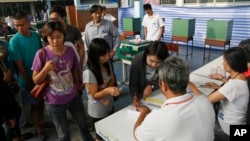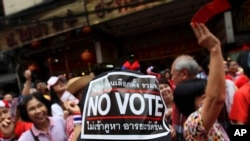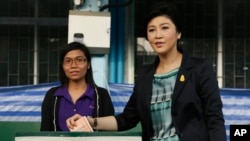BANGKOK —
Thai voters are casting ballots amid intense security Sunday, less than 24 hours after at least six people were wounded by gunshots and explosions when fighting broke between supporters and opponents of embattled Prime Minister Yingluck Shinawatra in a northern Bangkok Puea Thai Party stronghold.
The clashes broke out late Saturday when anti-government protesters, most of whom are boycotting the election, tried to block deliveries of ballot papers.
With the risk of further bloodshed running high when polls open, it is unclear whether the outcome of Sunday's election can ease the country's deep ideological divisions and widespread fears of further violence, or push the country deeper into political turmoil, protests and legislative limbo.
Prime Minister Yingluck called Sunday's snap election in a bid to end street protests against her government, after passage of a controversial amnesty bill seen as absolution for her older brother, former prime minister Thaksin Shinawatra, who lives abroad but faces a prison sentence in Thailand for corruption.
The secretary-general of the prime minister's office, Suranand Vejjajiva, defended the election and recently told VOA it was a way of easing the national political crisis.
"It's very important for Thai democracy, the February 2 poll,” said Suranand. “Of course the election is not everything; the election is part of the democratic process. But once the prime minister has dissolved the House [parliament], you have to go to elections."
The anti-government protest movement strongly disagrees. Former lawmaker Suthep Thaugsuban of the opposition Democrat Party, which is actively boycotting the polls, said Thailand needed political reforms before any elections could take place.
Specifically, Suthep said the opposition wanted Yingluck to step down, in order to end Thaksin's perceived influence over the Thai government from abroad.
Chuwit Kamolvisit, leader of the Rak Thailand Party, a smaller group that is taking part in the election, says he predicts more violence in coming days, and that the Democrat Party's call for an election boycott was a strategic mistake on part of the group's leader, Abhisit Vejjaijiva.
"Big mistake, because if [Abhisit] goes to the election, he can claim the vote 'no' [as] the Democrat vote," said Chuwit. "If someone votes 'no' [it] means 'I'm against the Thaksin regime.' Abhisit can claim that [if there is no boycott]. That's so easy. We can make sure we can see the vote. We don't need to fight, we don't need to sit down on the street."
In a bid to avoid a repeat of clashes last weekend when voters were obstructed during early voting, the government plans to deploy 10,000 police in Bangkok alone on Sunday.
While leaders of the anti-government protest movement say their constituents would not prevent people from voting, protesters in Phuket province Saturday blocked the main police station in an effort to prevent ballots from being sent to polling stations.
The pro-government "red-shirt" movement is calling on its supporters to boost the election turnout despite the threats and uncertainties.
Thailand's Election Commission, overseeing the vote, said disruptions at the polls could mean months of delay and by-elections before a new 500-member House of Representatives can convene. But even before then, some analysts say, the courts could nullify the election altogether.
Yingluck's government rejected the Election Commission's call to postpone the vote because of the fears of violence, and a shortage of tens of thousands of election-day volunteers. The boycott is having a noticeable effect in southern Thailand, where at least 28 districts have no registered candidates, and another two dozen have only a single candidate running unopposed.
Thailand's present political uncertainties and tensions have led to 10 deaths since November and almost 600 people injured.
Economists said the political tensions have taken a toll on the economy, with $1.3 billion in lost income from tourism and the central bank warning of more economic consequences to come.
Some information for this report comes from Reuters.
The clashes broke out late Saturday when anti-government protesters, most of whom are boycotting the election, tried to block deliveries of ballot papers.
With the risk of further bloodshed running high when polls open, it is unclear whether the outcome of Sunday's election can ease the country's deep ideological divisions and widespread fears of further violence, or push the country deeper into political turmoil, protests and legislative limbo.
Prime Minister Yingluck called Sunday's snap election in a bid to end street protests against her government, after passage of a controversial amnesty bill seen as absolution for her older brother, former prime minister Thaksin Shinawatra, who lives abroad but faces a prison sentence in Thailand for corruption.
The secretary-general of the prime minister's office, Suranand Vejjajiva, defended the election and recently told VOA it was a way of easing the national political crisis.
"It's very important for Thai democracy, the February 2 poll,” said Suranand. “Of course the election is not everything; the election is part of the democratic process. But once the prime minister has dissolved the House [parliament], you have to go to elections."
The anti-government protest movement strongly disagrees. Former lawmaker Suthep Thaugsuban of the opposition Democrat Party, which is actively boycotting the polls, said Thailand needed political reforms before any elections could take place.
Specifically, Suthep said the opposition wanted Yingluck to step down, in order to end Thaksin's perceived influence over the Thai government from abroad.
Chuwit Kamolvisit, leader of the Rak Thailand Party, a smaller group that is taking part in the election, says he predicts more violence in coming days, and that the Democrat Party's call for an election boycott was a strategic mistake on part of the group's leader, Abhisit Vejjaijiva.
"Big mistake, because if [Abhisit] goes to the election, he can claim the vote 'no' [as] the Democrat vote," said Chuwit. "If someone votes 'no' [it] means 'I'm against the Thaksin regime.' Abhisit can claim that [if there is no boycott]. That's so easy. We can make sure we can see the vote. We don't need to fight, we don't need to sit down on the street."
In a bid to avoid a repeat of clashes last weekend when voters were obstructed during early voting, the government plans to deploy 10,000 police in Bangkok alone on Sunday.
While leaders of the anti-government protest movement say their constituents would not prevent people from voting, protesters in Phuket province Saturday blocked the main police station in an effort to prevent ballots from being sent to polling stations.
The pro-government "red-shirt" movement is calling on its supporters to boost the election turnout despite the threats and uncertainties.
Thailand's Election Commission, overseeing the vote, said disruptions at the polls could mean months of delay and by-elections before a new 500-member House of Representatives can convene. But even before then, some analysts say, the courts could nullify the election altogether.
Yingluck's government rejected the Election Commission's call to postpone the vote because of the fears of violence, and a shortage of tens of thousands of election-day volunteers. The boycott is having a noticeable effect in southern Thailand, where at least 28 districts have no registered candidates, and another two dozen have only a single candidate running unopposed.
Thailand's present political uncertainties and tensions have led to 10 deaths since November and almost 600 people injured.
Economists said the political tensions have taken a toll on the economy, with $1.3 billion in lost income from tourism and the central bank warning of more economic consequences to come.
Some information for this report comes from Reuters.














